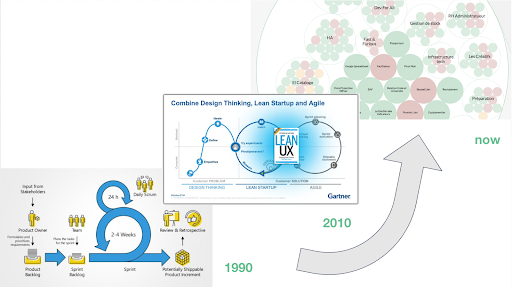The speed and dynamism of modern work outpace traditional job structures
I share with you here the essential points that I take away from reading “Work without Jobs”, the book by Ravin Jesuthasan and John W. Boudreau.
The conventional approach of defining work via “jobs” and individuals as “jobholders” is becoming outdated. The contemporary business environment, driven by digitization and automation, demands a fresh approach to work structure: a “work without jobs” operating system for enhanced organizational agility.
Traditional work frameworks originated during the Second Industrial Revolution. Though they’ve persisted, they’re not equipped for modern challenges. Due to these inflexible job-based structures, businesses grapple with adapting to emerging technologies and methodologies.
Agile methodologies, initially designed for software development, prioritize individuals, adaptability, and customer collaboration. These principles are crucial to the new work operating system. For instance, a consumer goods organization, despite adopting agile principles, faced collaboration barriers because of rigid job roles and descriptions.

In comparison to the conventional work operating system which begins with job roles, the new system focuses on tasks that need to be done. Traditional systems might question the implications of automation on current jobs, whereas this innovative approach asks what tasks exist (or will exist), who can perform them, and how best to engage talent, whether through full-time employment or alternative arrangements.
Here are the main principles of the new work operating system:
The previously mentioned consumer goods company could enhance its agility by breaking jobs into tasks. This change fosters collaboration and smooth task execution. Organizations must introspect their existing work structures, pinpointing areas demanding agility. Critical assessment areas include outdated job descriptions or situations where candidates lean towards non-traditional work setups.
However, the shift to this new approach won’t be uniform across all sectors of an organization. Some roles may remain aligned with the traditional system. Nevertheless, as time progresses, an increasing number of areas will benefit from these unconventional work engagement methods.
The book underscores a pressing need for a shift in the traditional work model. While certain jobs still fit within the conventional framework, the evolving nature of work demands a more agile approach, integrating automation and diverse work arrangements. Adopting this new operating system provides a strategic advantage for businesses to remain competitive in a changing landscape. The speed and dynamism of modern work outpace traditional job structures.
Though not all jobs will immediately fit this new paradigm, the trend is undeniably moving towards more flexible, non-traditional work structures.
Organizations must adapt to this new work operating system, particularly in domains requiring agility. Adopting such a system will future-proof businesses as the work landscape continues its pivot towards a “work without jobs” model.

Author: Luc bretones, Founder of NextGen
| Cookie | Duration | Description |
|---|---|---|
| cookielawinfo-checkbox-analytics | 11 months | This cookie is set by GDPR Cookie Consent plugin. The cookie is used to store the user consent for the cookies in the category "Analytics". |
| cookielawinfo-checkbox-functional | 11 months | The cookie is set by GDPR cookie consent to record the user consent for the cookies in the category "Functional". |
| cookielawinfo-checkbox-necessary | 11 months | This cookie is set by GDPR Cookie Consent plugin. The cookies is used to store the user consent for the cookies in the category "Necessary". |
| cookielawinfo-checkbox-others | 11 months | This cookie is set by GDPR Cookie Consent plugin. The cookie is used to store the user consent for the cookies in the category "Other. |
| cookielawinfo-checkbox-performance | 11 months | This cookie is set by GDPR Cookie Consent plugin. The cookie is used to store the user consent for the cookies in the category "Performance". |
| viewed_cookie_policy | 11 months | The cookie is set by the GDPR Cookie Consent plugin and is used to store whether or not user has consented to the use of cookies. It does not store any personal data. |